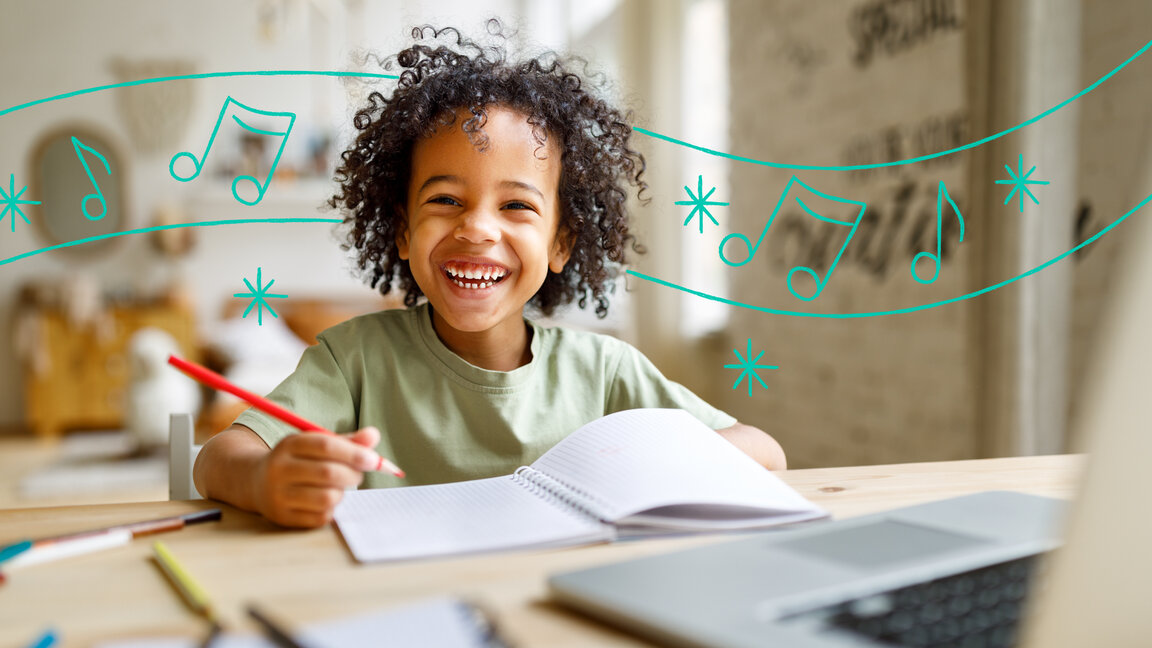
- 5 mins
Back-to-School Routines for Kids

It is widely accepted that music profoundly affects children’s learning and development. Numerous studies have shown that music can boost children’s cognitive abilities, improve their motor skills, and enhance their social and emotional development.
One of the most well-known studies on the subject was conducted by researcher Frances H. Rauscher in the early 1990s. Rauscher et al. (1993) found that children who received piano instruction showed significantly higher levels of spatial-temporal reasoning than those who did not receive musical training. In other words, the children who took piano lessons could better visualize objects in three-dimensional space and understand complex mathematical concepts.
Since Rauscher’s groundbreaking study, numerous other researchers have investigated the link between music and children’s cognitive abilities. A recent review of the literature by Miendlarzewska and Trost (2014) found that music training can improve children’s performance on various cognitive tasks, including those involving memory, attention, and executive function (i.e., the ability to plan and organize) and is accompanied by neuroplastic changes in brain functioning and brain structure.
Interestingly, the mere promise of listening to music can make children learn more effectively. According to Gold et al. (2019), individuals are more likely to complete learning tasks when they are promised a song they enjoy and like. Other studies have shown that music listening can improve children’s reading skills, memory, and even IQ scores. Linnavalli et al. (2018) suggest that if musical training is unavailable, including children in musical group activities can also lead to improved linguistic abilities.
So, what is it about music that seems to boost children’s brain power? One possibility is that music listening activates and engages the entire brain. When we listen to music, multiple brain regions are recruited to process the information. This “full-brain” activation may help to improve cognitive function by providing a mental workout. In addition, music listening may also stimulate the release of essential neurotransmitters, such as dopamine and serotonin, which can impact mood, attention, and learning.
If you are like most parents, you want to do whatever you can to help your kids succeed in school. That includes making sure they have a good environment to study in at home. And if you are looking for a little extra help in that department, some homework music specifically designed to help kids focus might be just what you need.
A number of different Moshi Music options are available. Below are a few suggestions among all the tracks to choose from. Each of these options has its own unique approach to helping kids focus.
This combines classical and modern music to create a calm atmosphere and earns its right to be one of the favorite “homework music” tracks.
On the other hand, this music track features a very relaxing and slow beat tune throughout this 30-minute track, which makes it another ideal homework music must-have.
This combines music with the sound of wind chimes to help kids relax and focus on completing homework.
Another favorite for teachers and parents alike! You can read about “quiet music” or background music for the classroom here.
Also created by the Mellow Moshiphonic Orchestra, this music track creates a relaxing environment well suited for homework tasks.
All of these options are great for helping kids focus while doing homework, but which ones are most suitable for your family? It really depends on what your kids respond to best. If they are having trouble focusing, try a few different options and see which ones are the most helpful.
Also, make sure you set some ground rules for whichever option you choose before starting. For example, ensure your kids know they should only use the music when they are working on their homework. That way, they might be more motivated to initiate the homework task or activity.
In the wise words of Billy Joel,
“I think music in itself is healing. It’s an explosive expression of humanity. It’s something we are all touched by. No matter what culture we’re from, everyone loves music.”
It is no secret that students today are under immense pressure. They are expected to juggle multiple classes, extracurricular activities, and social obligations while maintaining good grades. This can often lead to students feeling overwhelmed and stressed out.
One way to help alleviate some of this stress is by incorporating movement and brain breaks into homework time. Having your kids take a few minutes to move their bodies and give their brains a break can help them refocus and approach their work with fresh energy. There are a variety of ways to use Moshi to incorporate movement into homework time.
Goldie’s Five-Minute Brain Break is a great option. This track provides kids with a series of exercises that can be done in just five minutes. The exercises are designed to help them become more mindful in the present moment while also providing a mental break.
Another option is one of the 1-Minute Moshi Breathing exercises. This exercise can be done sitting or standing, and it only takes a minute to do. This exercise helps kids focus on their breath and relax their bodies.
Both these tracks have extremely relaxing background music to help children participate and stay calm within their mindfulness moments.
Hans Christian Anderson once said, “where words fail, music speaks.” Let the music do the work and watch your child complete their homework in a motivated way!
Gold, B. P., Mas-Herrero, E., Zeighami, Y., Benovoy, M., Dagher, A., & Zatorre, R. J. (2019). Musical reward prediction errors engage the nucleus accumbens and motivate learning. Proceedings of the National Academy of Sciences, 116(8), 3310–3315.
Linnavalli, T., Putkinen, V.,, Lipsanen. J., Huotilainen, M., & Tervaniemi, M. (2018). Music playschool enhances children’s linguistic skills. Scientific Reports, 8(1), 8767.
Miendlarzewska, E. A., & Trost, W. J. (2014). How musical training affects cognitive development: Rhythm, reward and other modulating variables. Frontiers in Neuroscience, 7, 279.
Rauscher, F. H., Shaw, G. L., & Ky, K. N. (1993) Music and spatial task performance. Nature, 365(6447), 611.